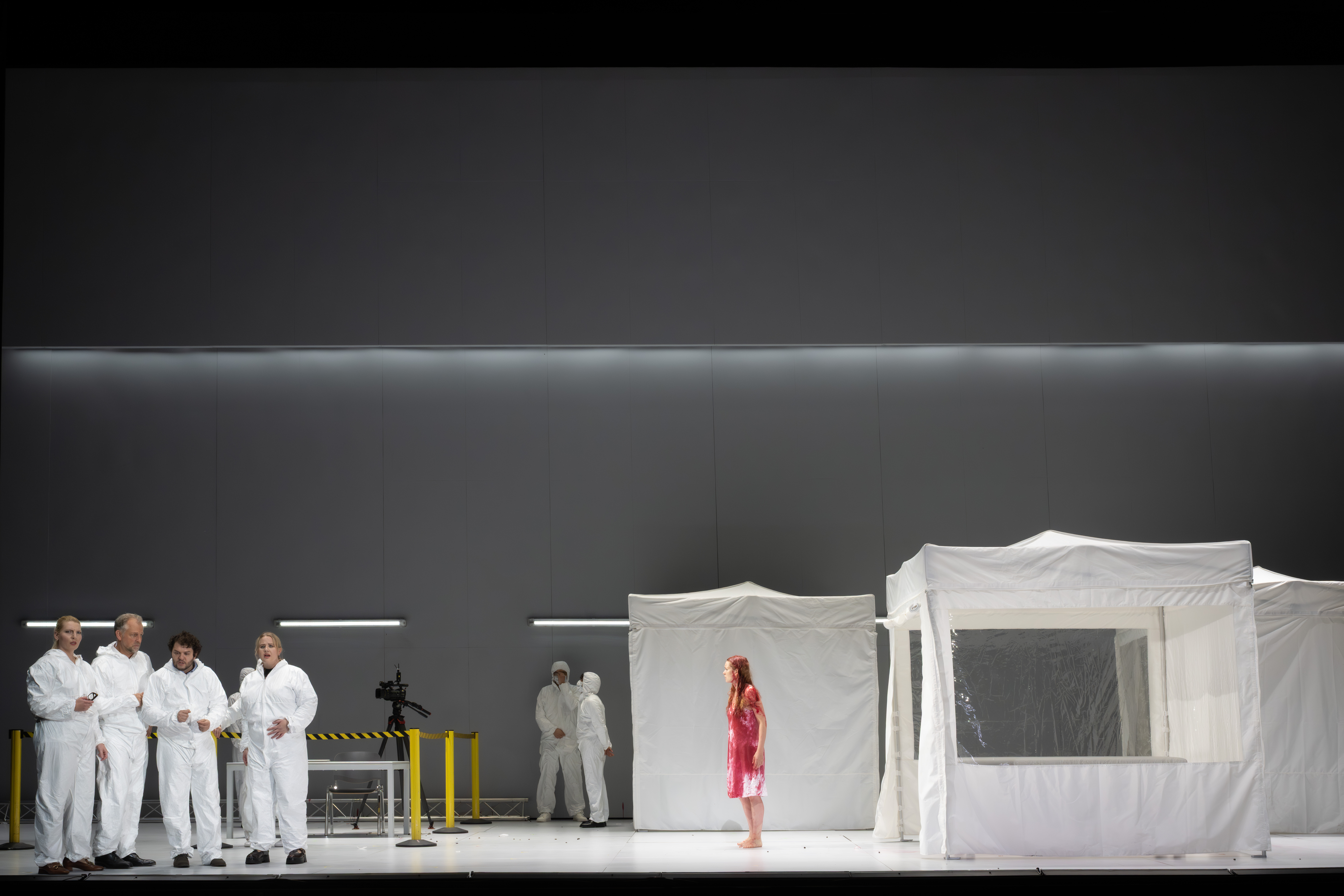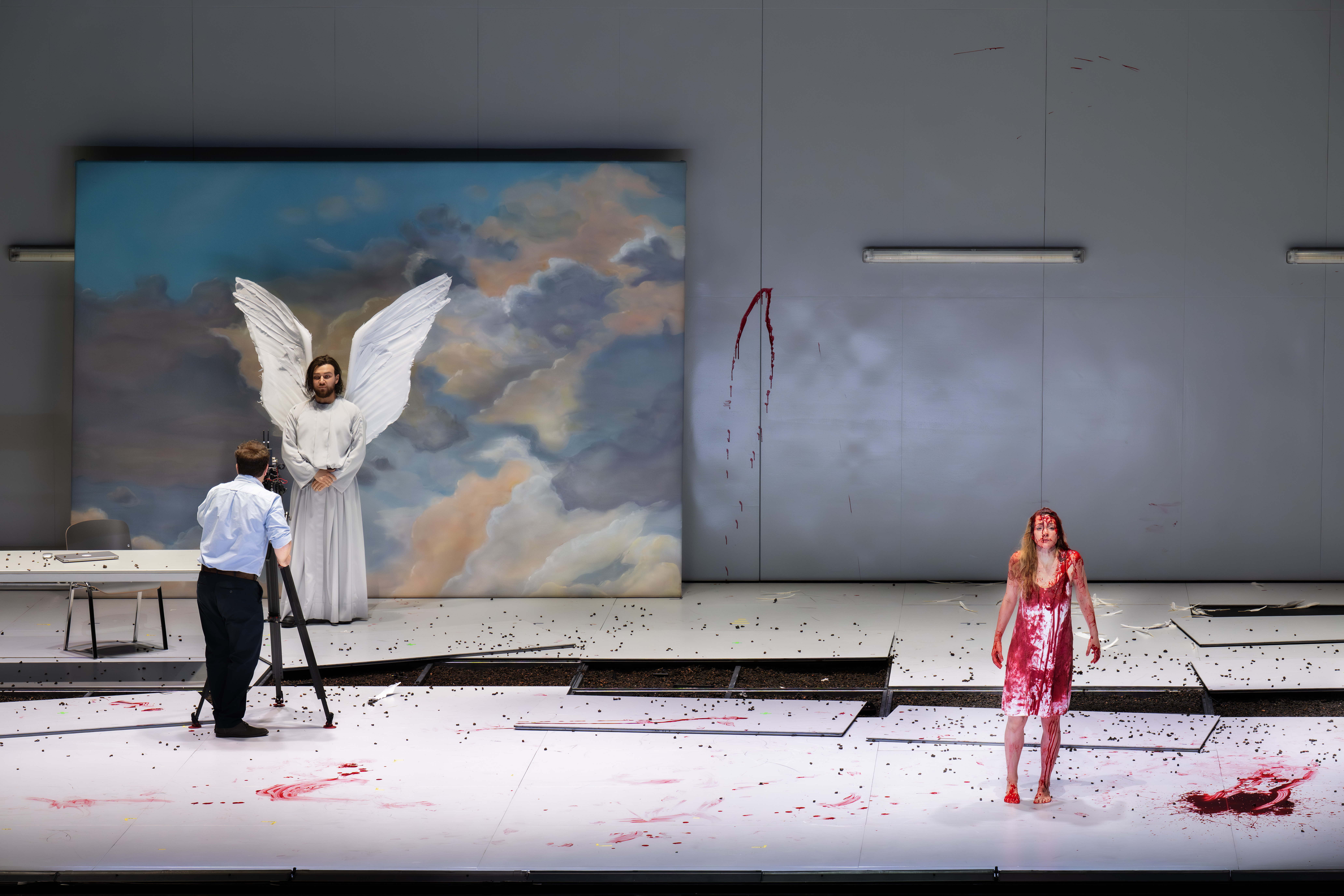You must pass through three crises: Tobias Kratzer presents Robert Schumann’s angelic Peri on a most dedicated mission towards paradise in his opening production at the Hamburg State Opera.
Making old stories experientially present—Tobias Kratzer succeeds in this time and again, with remarkable force. Even from the somewhat sentimental tale of the angelic Peri seeking her way back to paradise, he creates—through his staging at the Staatsoper Hamburg—a gripping parable about people in crisis and the courage to hold on to ideals of humanity.
Robert Schumann’s secular oratorio gains, under his direction, a stage potency it does not inherently possess. And had Kratzer not just come from such a sensational Tannhäuser in Bayreuth and incisive reinterpretations of three Strauss operas in Berlin, with three Ring instalments in Munich still ahead of him, he might not have chosen this romantic tale of emotional redemption for the opening of his Hamburg directorship. There would still have been treasures to unearth among the twentieth-century classics.
Within Rainer Sellmaier’s purely white set of simple walls and planes, Kratzer creates a politically charged triptych that sharpens abstraction just enough to express the inherent human qualities at stake in the work.
The Peri’s three attempts to be readmitted into heaven—marked by the trophies she must present to the gatekeeper—Kratzer aptly translates into a hero’s drama, a love drama, and a drama of compassion. What in Schumann thus rises in three upward stages—musically sublimating as it ascends—Wagner simultaneously generates in his conception of the music drama, inasmuch as his heroes, not least in Parsifal, are always psychologically questioned and fragile: lovers and redeemers at once.
In the first part, the Peri brings the drop of blood from a hero fallen in the struggle for freedom against an authoritarian ruler. Kratzer here skilfully stages mass dynamics and social conformity. And the Peri not only receives a drop of the hero’s blood but ends up standing in a blood-soaked dress. For she always throws herself completely into her mission—empathic already at this point.
In the second part, Kratzer envisions a reflection of the pandemic: people forbidden to approach one another, a loving couple separated. While he languishes in a quarantine tent, his beloved breaks in to be with him, even at the cost of her life. Thus the Peri may claim the lovers’ final sigh as they die in each other’s arms upon the sickbed.

But all this still does not suffice to move heaven. Sellmaier lets the gatekeeper glide in as an angel with great wings before baroque clouds—a somewhat folksy, cheerful take on transcendence. Kratzer, however, excels in the concrete: in the third part, children play beneath a glass dome in a toy-world marked by smoking chimneys as endangered. Yet in the face of this climate crisis, even the businessman must weep—tears of remorse, which, from a Christian perspective (in this otherwise Oriental tale), indeed mark the sole path to forgiveness and paradise.

But what is paradise to look like? Here Kratzer retreats into the Protestant oratorio tradition. A black-clad concert choir takes the Peri in as a fellow singer, as in a Bach cantata—which for some is already the fullest artistic expression of paradise. Yet there is to be no idyllic world at the end, despite all musical harmony: the Peri seems ill at ease among them and quietly slips away. Hmm—has empathy already faded? Must one not also stand together? Can one flee from heaven? Then it was none. Here Kratzer pushes his principle of reservation too far.
Nor do the staged fake audience members succeed—those whom Kratzer has the camera zoom out on from within the crowd. They are clearly rehearsed performers: a woman who boos against the blood scenes in the first act and leaves the hall; in the second, a man calmly asleep beside his masked, indignant wife; and in the third, an elderly gentleman who seems to recognise himself in the repentant character and bursts into tears.

This kind of audience staging should be unnecessary for Kratzer. All of Hamburg greets him with great sympathy, which he well deserves. He need not portray the audience as intolerant, sleep-deprived, or mawkish—especially as the sleeper, during the most moving music, provokes laughter. Kratzer must have foreseen that; why then sacrifice empathy and music—whose defence he has so vigorously undertaken—to such cheap laughs?
At the podium, Felix Hornbachner lets Schumann’s tender, indeed energetic, at times almost folksily skipping music unfold in its romantically idealistic aura. And Vera-Lotte Boecker is such a magnificently acting and superbly singing Peri that no doubt remains as to the immediacy of this woman. Her bright soprano possesses fine roundness, endurance, and full brilliance even into the demanding finale.
As the gatekeeper-angel, Ivan Borodulin gives his countertenor growing power over the course of the evening. Tenor Lunga Eric Hallam, soprano Eliza Boom, and mezzo Kady Evanyshyn sing with fitting clarity, Annika Schlicht shines with a rich alto, and Christoph Pohl gives both the dictator and the old man vivid character through his baritone. The opera chorus convinces with beautifully balanced sound.
Schumann would surely be astonished to see his Peri on the operatic stage—and even more so to find it shown as a music drama, indeed three of them. May its appeal for empathy resonate in the world.